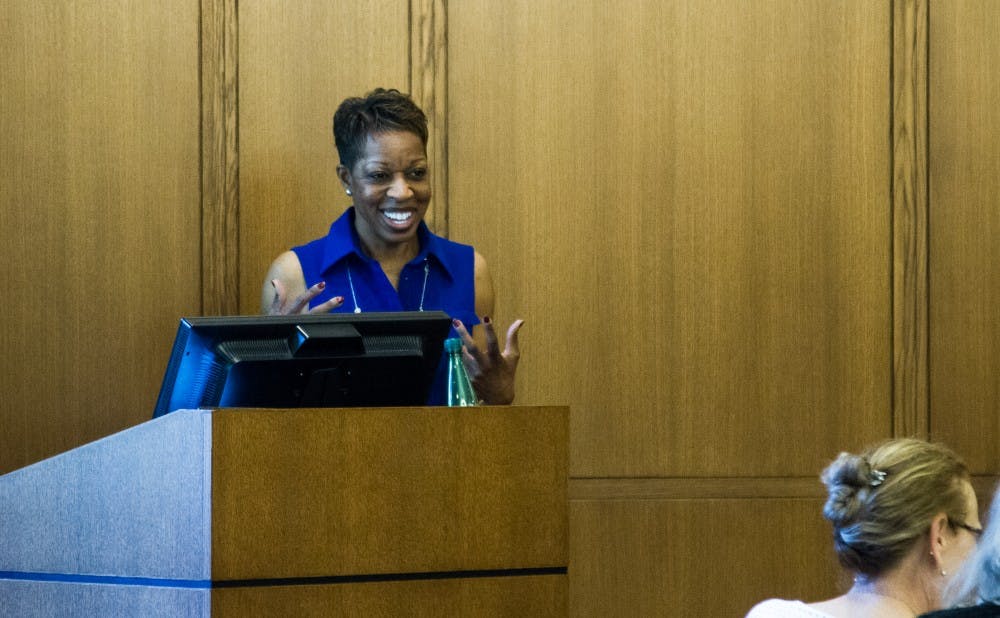Arts and Sciences Council will take a pause and evaluate the next steps to revamp the Trinity curriculum.
Valerie Ashby, dean of the Trinity College of Arts and Sciences, addressed the Council's Thursday meeting, explaining that she had recently met with nearly all of the 32 Trinity department chairs about the proposed changes to the curriculum. The primary consensus that came out of these conversations was that council members should slow the curriculum process in order for them to become collectively excited about it.
"A narrow passing [of a curriculum] doesn't feel great to me as a start for a successful implementation which is our responsibility," Ashby said.
She encouraged faculty to cast aside all “negative energy” moving forward and to “take a pause of any length” if necessary.
The new curriculum proposal—called “The BluePrint”—has received criticism, especially at the Council's March 10 meeting in which representatives of multiple departments said their department had told them to vote against the proposal. Faculty members in departments like philosophy, statistical science, history and sociology said they would vote against the curriculum in its current iteration.
"The faculty on the [Imagining Duke Curriculum] committee would like to incorporate feedback into another proposal before we move to the amendment and voting process," Interim Council Chair Sherryl Broverman, associate professor of the practice of biology, previously told The Chronicle. "[The Executive Committee of the Arts and Sciences Council] and the deans are trying to carefully balance moving forward with a new curriculum and moving forward with the right curriculum that excites the most faculty."
Several of the faculty proposed ways to get more feedback about a potential curriculum.
Shai Ginsburg, associate professor in the department of Asian and Middle Eastern studies, said he wants to see students involved in the process.
He added that the Council must also decide whether the new curriculum will target a particular “type” of student, and if so, whether a closer collaboration with the admissions office will be necessary to identify those types of students from the time they initially apply.
But Duke does not select students in that way, argued Carol Apollonio, professor of the practice of Slavic and Eurasian studies. She noted that many of the challenges students face during their time on campus are not going to be solved by simply drafting a new curriculum.
J. Lorand Matory, Lawrence Richardson professor of cultural anthropology, encouraged fellow council members to recognize the maturity of undergraduates and their capacity to “think critically enough to change the world themselves.”
“These are not children, they are young adults," he said. "So how do you persuade young adults to embrace your values?”
In addition to ways to increase feedback about a proposal, another key subject of discussion was how to assess the role of requirements within the new curriculum.
Jonathan C. Mattingly, professor of mathematics and statistical science, noted that Curriculum 2000—the existing curriculum for Trinity undergraduates—is often criticized as “anti-intellectual” and as a series of “checkboxes.”
Faculty have a responsibility to teach their students intellectual curiosity by requiring a representative sample of the liberal arts education, argued Thomas Pfau, Alice Mary Baldwin professor of English. The process of laying out requirements is not unlike laying down the rules as a parent, he said.
“Much of parenting boils down to some requirements too, and it can’t always be about what you want or what is good for you,” he said.
Junior Surya Prabhakar—a student in attendance—mirrored Pfau’s view by explaining that had it not been for the various requirements of the existing Duke curriculum, he probably never would have deviated beyond his “pre-professional” economics track and developed the intellectual curiosity that he has today, prompting applause from everyone in attendance.
David Malone, professor of the practice of education, pointed out that in his 27 years of attending Arts and Sciences Council meetings, Thursday’s was the most well-attended. He added that it is this dedication on the part of faculty members that will be instrumental in approving a new curriculum down the road.
“We have to start with our values, vision and what it means to us as faculty,” he said.
Get The Chronicle straight to your inbox
Sign up for our weekly newsletter. Cancel at any time.

